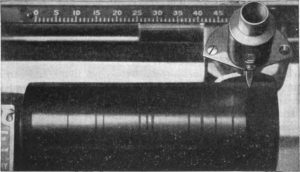Copyright Office Issues Report on Extending Federal Protection to Pre-1972 Sound Recordings
January 6, 2012
 I’ve written before about common law copyright protection of sound recordings made before February 15, 1972. Although the Sound Recording Amendments to the 1909 Copyright Act extended federal copyright law to sound recordings, it only did so to sound recordings made on or after February 15, 1972. Per the amendments, federal copyright law does not preempt state common law or statues regarding pre-1972 sound recordings until February 15, 2067. This has resulted in a meshwork of state common law copyright protecting – or not protecting – pre-1972 sound recordings. In 2009, Congress instructed the Copyright Office to conduct a study on the “desirability and means” of extending federal copyright protection to pre-1972 sound recordings, and hearings on the subject were held throughout 2011. Late last month, the Copyright Office issued a report (“Federal Copyright Protection for Pre-1972 Sound Recordings”) recommending that pre-1972 sound recordings be brought under federal jurisdiction. The Copyright Office asserted that not only is there very little information as to why Congress opted to omit pre-1972 sound recordings, bringing them under federal jurisdiction would “best serve the interest of libraries, archives and others in preserving old sound recordings and in increasing the availability to the public of old sound recordings.” Further, it would bring clarity to this muddled area of copyright. A few interesting recommendations from the report regarding proposed terms of protection for pre-1972 sound recordings:
I’ve written before about common law copyright protection of sound recordings made before February 15, 1972. Although the Sound Recording Amendments to the 1909 Copyright Act extended federal copyright law to sound recordings, it only did so to sound recordings made on or after February 15, 1972. Per the amendments, federal copyright law does not preempt state common law or statues regarding pre-1972 sound recordings until February 15, 2067. This has resulted in a meshwork of state common law copyright protecting – or not protecting – pre-1972 sound recordings. In 2009, Congress instructed the Copyright Office to conduct a study on the “desirability and means” of extending federal copyright protection to pre-1972 sound recordings, and hearings on the subject were held throughout 2011. Late last month, the Copyright Office issued a report (“Federal Copyright Protection for Pre-1972 Sound Recordings”) recommending that pre-1972 sound recordings be brought under federal jurisdiction. The Copyright Office asserted that not only is there very little information as to why Congress opted to omit pre-1972 sound recordings, bringing them under federal jurisdiction would “best serve the interest of libraries, archives and others in preserving old sound recordings and in increasing the availability to the public of old sound recordings.” Further, it would bring clarity to this muddled area of copyright. A few interesting recommendations from the report regarding proposed terms of protection for pre-1972 sound recordings:
- The term of protection should be 95 years from publication or, if not published, 120 years from fixation, although no term should extend past February 15, 2067.
- In all cases, the term of copyright protection for all pre-1972 sound recordings cannot continue past February 15, 2067.
- Interestingly, for sound recordings published before 1923, the copyright owner would be able to obtain protection for 25 years from enactment of legislation that federalizes protection by: (i) making the work available to the public “at a reasonable price” and (ii) filing with the Copyright Office notice of the owner’s intent to secure protection. This means that pre-1923 works will by default go into the public domain unless the copyright owner actively pursues protection.
- For sound recordings published between 1923 and 1972 and which are scheduled to expire before February 15, 2067, the copyright owner would be able to extend the term through 2067 by: (i) making the work available to the public “at a reasonable price” and (ii) filing with the Copyright Office notice of the owner’s intent to secure protection until 2067. For example, a work published in 1925 would expire in 2020 under the federal scheme. The copyright owner, however, could extend the term through 2067 by completing the listed steps.

